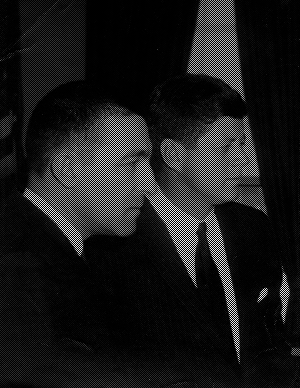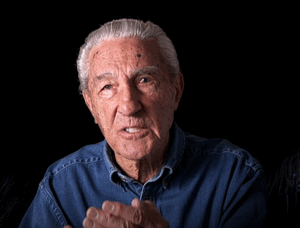Sun Sets on Udall
Air Date: Week of March 26, 2010

Stewart Udall with President Kennedy.
As Secretary of the Interior under Presidents John F. Kennedy and Lyndon Johnson, Stewart Udall fought to protect the nation's water, air, and land. His unrelenting belief that wilderness needed protection was instrumental in the creation of national parks and the passage of the 1964 Wilderness Act Living on Earth offers this tribute to Stewart Udall.
Transcript
YOUNG: Stewart Udall, former congressman, interior secretary and towering figure of conservation died this month. He was 90-years-old. As secretary of the interior for presidents Kennedy and Johnson, Stewart Udall was instrumental in passing fundamental environmental laws in the 1960s. He reflected on that period in a 2006 interview with Living on Earth.
STEWART UDALL: Protecting endangered species, cleaning up the nation's rivers, clean air, clean water. And it was a wonderful time, kind of a golden age of the environmental movement.
YOUNG: He worked with his brother, Arizona congressman Morris Udall, to create national parks like Redwood in California and Canyonlands in Utah—names now synonymous with America’s natural heritage. And Stewart Udall was the driving force behind the creation of the 1964 Wilderness Act.

Stewart Udall with President Kennedy.
UDALL: It was just the right time for a new big idea like this, you know. No other country in the world had a wilderness policy. And it just struck a chord. It was very popular in the 1960s. Now, we had to fight, and it took four years to get it done, but it turned out there was overwhelming support in this country. And all of us—I was startled, even, at the margin by which it passed the Senate, which I think was 78 to 12. That shows you it was bipartisan, and it was across the country. We had tremendous support for it. And this was really an expression of the desires of citizens.
YOUNG: The country’s wilderness system now protects some 107 million acres.
Later, Stewart Udall fought to win compensation for Native Americans poisoned by uranium mining and nuclear weapons tests.
He also wrote about western history, energy problems and landscape conservation.
And Mr. Udall tapped into great voices from American literature to expand America’s environmental consciousness. He invited writers and poets like Wallace Stegner and Robert Frost to Washington.
TRAUTWEIN: Here’s a guy who could talk to Robert Frost in the morning and Lyndon Johnson in the afternoon and have both of their ears.
YOUNG: That’s Mark Trautwein. He got to know the Udalls during his 13 years of work as legislative assistant to Congressman Morris Udall.
TRAUTWEIN: Over an arc of 30 years, Stewart and Mo Udall were the indispensable men of the conservation movement in America because Stewart got it. He got that we could not go on consuming ourselves and that our natural heritage was something to be nurtured.

YOUNG: What was it about the Udalls that made them do that, that drove them?
TRAUTWEIN: They were men who believed in public service, they believed in the greater good, and they were quintessentially men of the west. But a kind of a modern western consciousness that looked at landscape that had been handed down and saw that great deal of what was valuable about and so important about it was being lost. And they learned lessons from what they saw around them and they sought to apply them to their politics and to their life’s work.
YOUNG: The Udall brothers also built something else—a family political dynasty. Each brother had sons who are now U.S. senators. Mo’s son Mark is a Colorado Senator. Stewart’s son Tom is a senator from New Mexico.
TOM UDALL: My father instilled in me the idea that if you take care of the land the land will take care of you. It's very important what my father and Mo did. It's a very significant legacy. And I appreciate it and I think the American people appreciate it, and I think they'd like us to expand on that.
YOUNG: But in our 2006 interview, Stewart Udall wasn’t so sure that his son and nephew—or any political leaders—could do ambitious conservation today. The political environment, he thought, made environmental gains on the scale of the Wilderness Act unlikely.
S. UDALL: I believe if you proposed the wilderness bill today, it would not go through Congress. The divisions are so sharp and the ideologies are so different that I doubt it would get to first base. It has become an ideology that more conservation is not good for the country and it makes me sad. I'm a saddened person compared to what I was in the 1960s. But maybe it'll turn, there are cycles in history, maybe it'll turn again in the direction it was.
YOUNG: The map of this country bears witness to Stewart Udall’s impact in the national parks, scenic rivers and wildlife refuges he helped create. One place in particular stands out. The easternmost point of the U.S. territories—the tip of St. Croix, in the U.S. Virgin Islands—is named Point Udall, in Stewart Udall’s honor. A massive stone sundial there greets the first rays of the rising sun to fall on U.S. land. A fitting tribute to a man whose legacy casts a long shadow over us all.
Living on Earth wants to hear from you!
Living on Earth
62 Calef Highway, Suite 212
Lee, NH 03861
Telephone: 617-287-4121
E-mail: comments@loe.org
Newsletter [Click here]
Donate to Living on Earth!
Living on Earth is an independent media program and relies entirely on contributions from listeners and institutions supporting public service. Please donate now to preserve an independent environmental voice.
NewsletterLiving on Earth offers a weekly delivery of the show's rundown to your mailbox. Sign up for our newsletter today!
 Sailors For The Sea: Be the change you want to sea.
Sailors For The Sea: Be the change you want to sea.
 The Grantham Foundation for the Protection of the Environment: Committed to protecting and improving the health of the global environment.
The Grantham Foundation for the Protection of the Environment: Committed to protecting and improving the health of the global environment.
 Contribute to Living on Earth and receive, as our gift to you, an archival print of one of Mark Seth Lender's extraordinary wildlife photographs. Follow the link to see Mark's current collection of photographs.
Contribute to Living on Earth and receive, as our gift to you, an archival print of one of Mark Seth Lender's extraordinary wildlife photographs. Follow the link to see Mark's current collection of photographs.
 Buy a signed copy of Mark Seth Lender's book Smeagull the Seagull & support Living on Earth
Buy a signed copy of Mark Seth Lender's book Smeagull the Seagull & support Living on Earth

